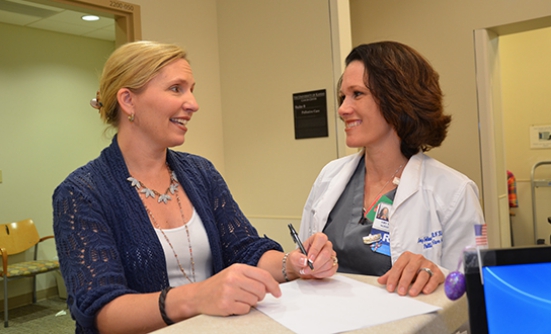You have just received the news from your physician that you have a diagnosis of lung cancer. You are stunned at hearing this diagnosis and do not remember or comprehend what steps come next.1 A key step in understanding and living with the diagnosis of cancer involves becoming educated and informed regarding treatment options and symptom management. Incorporating what you know and learn about the disease will help you develop coping strategies leading to a better quality of life in dealing with this unexpected life event.2
During the time of your initial visit, it is important to bring another family member or close friend with you to the appointment. Bring a tablet and pen and write down all questions you want to know the answers to. Having family support during this visit is an important factor in helping you understand what the next steps will be in your treatment, because they can be a second set of ears in hearing the proposed treatment plan. Having such a plan in place decreases misunderstanding and empowers you as a patient by knowing your treatment options.
A combination of healthcare professionals will be involved in your care. They include a medical oncologist, thoracic surgeon, radiation oncologist, pulmonologist, nurse practitioners, oncology nurses, social workers, nurse navigators, case managers, and your primary care physician. It is important you are comfortable with asking questions and discussing treatment options with your multidisciplinary cancer team, as they are instrumental in ensuring you receive the best possible care.
Questions you may have include: What caused my lung cancer? What are the types of lung cancer? How do doctors diagnose it? Can I get a second opinion? What treatments are available? Are there clinical trials available to treat it? What is my prognosis? What questions should I ask of my oncologist? What resources are available to help me with decision-making.3
Causes of lung cancer are not always known. Examples of risk factors include history of smoking, exposure to second- hand smoke, asbestos exposure, and inherited or genomic mutations. Lung cancer is divided into 2 classes: non–small cell lung cancer and small cell lung cancer. Non–small cell lung cancer has subtypes based on the histology of the tumor: adenocarcinoma, squamous cell carcinoma, and large cell carcinoma.
Initial diagnosis is made after obtaining a biopsy of the tumor. This biopsy is done in one of several ways: CT-guided lung biopsy, bronchoscopy, endobronchial ultrasound, or navigational bronchoscopy. The information obtained from the biopsy will provide a clinical stage for the tumor. Depending on the size and location of the tumor, you will then see a thoracic surgeon to discuss removal of the tumor by surgery. Upon lung surgery completion, the tumor will be measured and tested for molecular mutations, such as KRAS, EGFR, ROS1, BRAF, as well as PD-L1 expression. These markers are important for the treating oncologist to know because of treatment options, such as immunotherapy and oral chemotherapy agents, being available to treat patients with 1 of these mutations.
If you are unsure of your initial diagnosis and wish to seek a second opinion, most insurances will cover the cost. Please check with your insurance provider first before seeking a second opinion to make sure it is covered. In general, a second opinion is covered to confirm your diagnosis, determine if the cancer has spread, gain perspective from specialists with varied expertise, and give you confidence on how to move forward with your treatment plan.
Treatments available to treat lung cancer include surgery, which may include any of the following: wedge resection (a portion of the lobe is removed), segmentectomy (1 or more segments of the lobe are removed), and lobectomy (complete resection of the lobe of the lung).4 The surgeon will also remove lymph nodes from the lung and chest to check for cancer cells. Radiation therapy, chemotherapy, immunotherapy, and targeted therapy are also used to treat lung cancer, depending on the size, location, and molecular profile of the tumor. Cancer treatment today involves personalized care dependent on the type of tumor, its genetic characteristics, and the National Comprehensive Cancer Network guidelines. Patients with cancer are involved in the decision-making of their treatment plan and are sometimes provided more than 1 option to choose from. Physicians discuss at length options for treatment so patients will be informed regarding risks and benefits of the therapy they choose.
Clinical trial participation is available for patients with lung cancer. If you are interested in taking part in a trial, you and your doctor can have a discussion regarding the possibility of this option as part of your treatment plan. Clinical trials can offer many patients the ability to receive innovative cancer treatments that have shown promise in prior research. Options for clinical trial participation are based on the type and stage of lung cancer you have and your overall physical health. Safeguards are in place to protect participants; there are risks and benefits to participating, and you can withdraw from a study at any time.3
Do not be afraid to ask questions of your doctors and other healthcare professionals. If you do not understand something, please ask for clarification. Bringing a family member or trusted friend with you to an appointment can help you deal with feelings of hopelessness and provide you with emotional support and a second set of ears. Be cautious about what you read on survival statistics. Find a doctor you trust and feel comfortable with. Participate in activities outside your home, such as a support group or exercise groups at the neighborhood gym. Be aware of community resources available to assist you, such as the American Cancer Society and the American Lung Association.
Remember you are not alone, and knowing more about your disease will make you better equipped to understand and determine your treatment path. Lung cancer resources include:
- American Cancer Society – www.cancer.org
- American Lung Association – www.lung.org
- American Society of Clinical Oncology – www.cancer.net
- Lung Cancer Research
- Foundation – www.lcrf.org
- National Cancer Institute – www.cancer.gov
References
- American Society of Clinical Oncology. Introduction. In: ASCO answers: Non-Small Cell Lung Cancer. Alexandria, VA: American Society of Clinical Oncology; 2018.
- Oncology Nursing Society. Daugherty P, Gamblin K, Rummel M, eds. Oncology Nurse Navigation Case Studies. Pittsburgh, PA: Oncology Nursing Society; 2017.
- Addario BJ. Navigating Lung Cancer 360 Degrees of Hope (4th ed). San Carlos, CA: Bonnie J. Addario Lung Cancer Foundation; 2018.
- Oncology Nursing Society. Lung Cancer (2nd ed). Pittsburgh, PA: Oncology Nursing Society; 2012.











